-
FastDFS——从入门到入土(上)
初识FastDFS
FastDFS是一个开源的轻量级分布式文件系统。它解决了大数据量存储和负载均衡等问题。特别适合以中小文件为载体的在线服务,如相册网站、视频网站等等
1.什么是分布式文件系统?
随着文件数据越来越多,通过 Tomcat 或 Nginx 上的动静态资源文件在单一的服务节点中是存不下的
如果使用多节点来存储的话这会大大增加我们的运维成本,不利于管理和维护
所以我们需要一个解决方案,能够通过一个系统来管理多个节点上的文件数据,分布式文件系统应运而生
特点
分布式文件系统允许文件通过网络存储在多台节点上,多台存储节点组成一个整体,为更多用户提供文件分享和存储空间等功能
虽然是一个分布式文件系统,但对用户是透明的,用户在使用的时候就像在访问本地文件系统一样
分布式分布式,那说明肯定不止一个节点,所以分布式文件系统可以提供冗余备份,容错能力很高,就算系统中有节点宕机,整体还是能够对外提供服务的
除此之外,分布式文件系统还可以实现负载均衡,用户读取某一文件的时候可以由多个节点共同提供,而且还可以通过横向扩展来保证性能提升与分担负载
- 文件不分块存储,上传的文件和OS文件系统中的文件一一对应
- 支持相同内容的文件只保存一份,节约磁盘空间
- 下载文件支持HTTP协议,可以使用内置Web Server(5.0之后废弃),也可以和其他Web Server配合使用(nginx)
- 支持在线扩容
- 支持主从文件
- 存储服务器上可以保存文件属性(meta-data)
- V2.0网络通信采用libevent,支持大并发访问,整体性能好
官方网站:https://github.com/happyfish100/
配置文档:https://github.com/happyfish100/fastdfs/wiki/2.架构
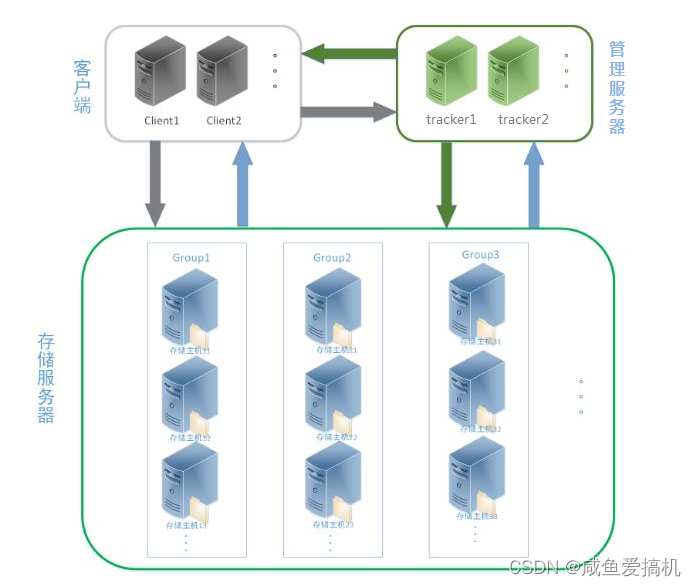
- 跟踪服务器(tracker server)
tracker server 主要负责调度服务,提供负载均衡
tracker server 将集群中所有存储组和 storage server 的状态信息等存放在内存中
tracker server 是 client 和 storage server 交互的枢纽
storage serve 在启动后会自动连接 tracker,告知自己的 group 信息并保持周期性的心跳,tracker根据 storage 的心跳信息,建立 group==>[storage server list] 的映射表- 存储服务器(storage server)
storage 上存储了文件的元文件的信息,它直接利用 OS 的文件系统来调用或管理文件
storage 以组或卷(group或volume)来作为单位,一个 group 内包含多台storage ,数据互相备份
利用 group 可以实现数据隔离、负载均衡、应用隔离等功能
数据隔离:将不同应用的数据放在不同 group 下
负载均衡:根据应用的访问特性来将应用数据分配到不同 group 下来做负载均衡group 内的每台 storage 都依赖于本地文件系统,storage 可以配置多个存储目录,当收到写请求时,会根据配置好的规则来选择其中一个存储目录来存储文件
为了避免单个目录下的文件数太多,在storage第一次启动时,会在每个数据存储目录里创建2级子目录,每级265个,总共65535个文件。新写的文件会以hash的方式路由到某个子目录下。然后将文件数据直接作为一个本地文件存储到该目录中
- 客户端(client)
作为业务请求发起方,通过专门接口,使用TCP/IP协议与tracker server或者storage server进行数据交互
FastDFS向使用者提供基本文件访问接口,比如upload、download、append、delete等,以客户端库的方式提供给用户使用
Tracker集群
FastDFS集群中的Tracker server可以有多台,Tracker server之间是相互平等关系,同时提供服务Trackerserver不存在单点故障。客户端请求Trackerserver采用轮询方式,如果请求的tracker无法提供服务则换另一个tracker
Storage server会连接集群中所有的Tracker server,定时向他们报告自己的状态,包括磁盘剩余空间、文件同步状况、文件上传下载次数等统计信息
Storage集群
为了支持大容量,storage server采用了分组的形式。存储系统由一个或多个group组成,group之间的文件是相互独立的,所有group内的文件容量累加就是整个存储系统中的文件容量一个group内包含一台或多台storage server,group内的storage是平等关系,不同group内的storage不会相互通信,同group内的storage之间会相互连接进行文件同步,从而保证同group内的每个storage上的文件完全一致
在group中添加 storage时,系统会自动同步已有的文件系统,同步完成后,系统自动将新增storage到线上提供服务。当存储空间不足或者即将耗尽时,可以动态添加group。只需要增加一台或多台storage并将它们配置到同一个group内就行
FastDFS初始化过程
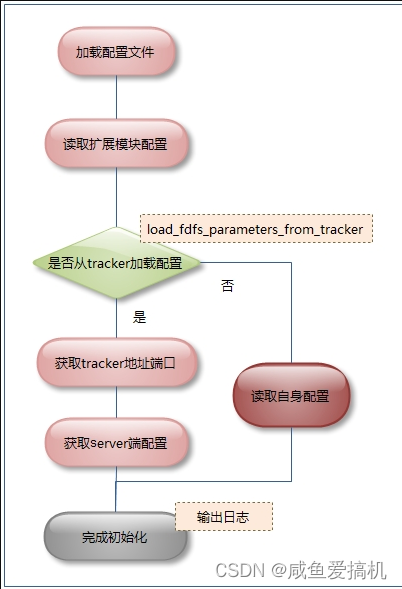
FastDFS文件操作
1.上传
FastDFS向使用者提供基本文件访问接口,比如upload、download、append、delete等,以客户端库的方式提供给用户使用
当tracker收到客户端上传文件的请求时,会为该文件分配一个可以存储文件的group,当选定了group后就要决定给客户端分配group中哪一个storage
分配好storage后,将客户端请求分发到指定storage上,storage会为文件分配一个数据存储目录然后为文件分配一个fileid,最后根据以上的信息生成文件名存储文件,Storage将文件写入磁盘后,会返回路径信息给客户端,客户端就可以根据这个路径信息找到上传的文件
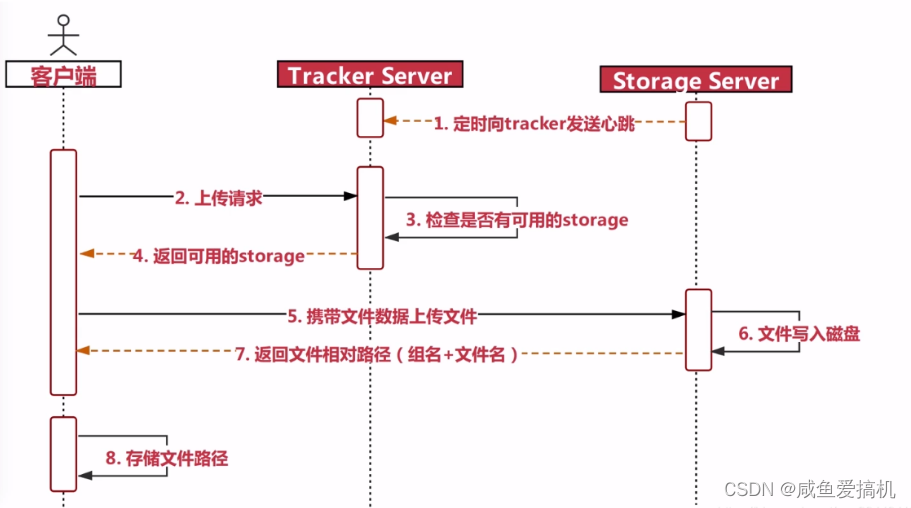
2.下载
Storage会定时的向Tracker安装发送心跳,告诉Tracker自己还还活着,这样Fastdfs就可以工作了
客户端发送下载请求到Tracker上,Tracker查找到存储的Storage地址后返回给客户端
客户端拿到Storage地址后,去Storage上找到文件
Storage把文件返回给客户端
group1/M00/02/44/Swtdssdsdfsdf.txt 1.通过组名tracker能够很快的定位到客户端需要访问的存储服务器组是group1,并选择合适的storage提供客户端访问。 2.storage根据“文件存储虚拟磁盘路径”和“数据文件两级目录”可以很快定位到文件所在目录,并根据文件名找到客户端需要访问的文件。- 1
- 2
- 3
- 4
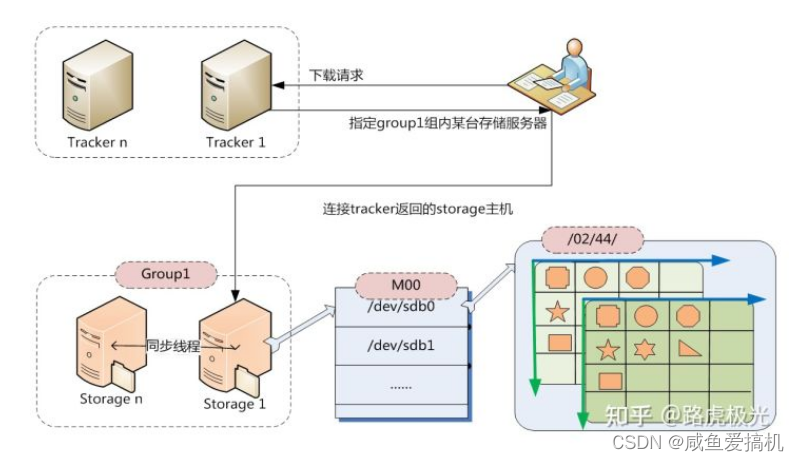
拓展模块
在大多数业务场景中,往往需要为FastDFS存储的文件提供http下载服务,而尽管FastDFS在其storage及tracker都内置了http服务, 但性能表现却不尽如人意;
作者余庆在后来的版本中增加了基于当前主流web服务器(nginx/apache)的扩展模块,其用意在于利用web服务器直接对本机storage数据文件提供http服务,以提高文件下载的性能
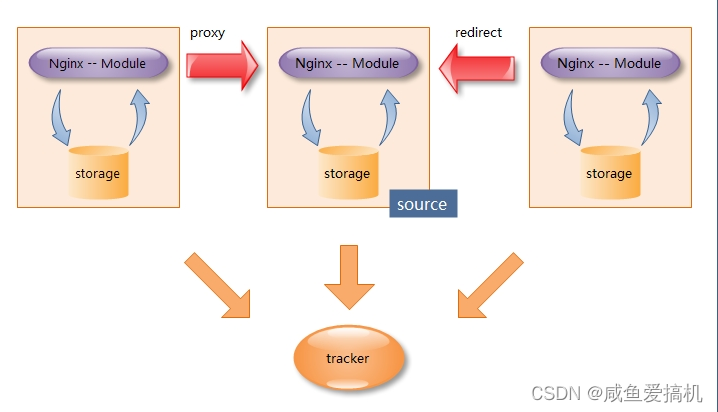
在每一台storage服务器主机上部署Nginx及FastDFS扩展模块,由Nginx模块对storage存储的文件提供http下载服务, 仅当当前storage节点找不到文件时会向源storage主机发起redirect或proxy动作例如:文件上传至节点A,但是通过负载均衡之后,访问了节点B,则不能访问文件,所以会出现时而能访问时而不能访问的结果,而FastDFS扩展模块就可以解决这个问题,它会发起重定向或者代理的动作
文件下载过程
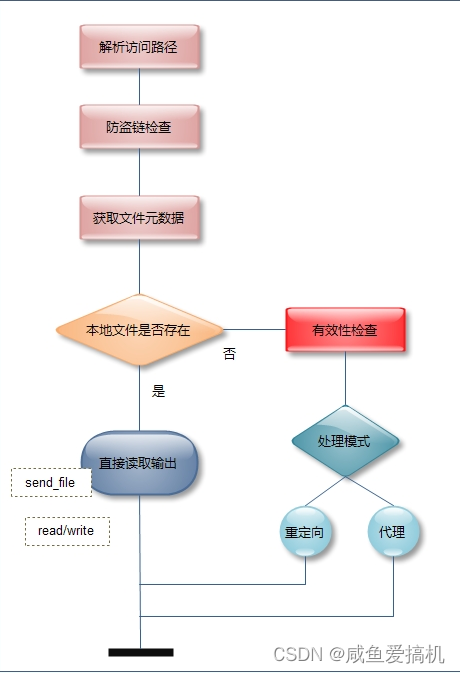
单机部署
单机:192.168.149.131
注:一定要先启动Tracker,在启动Storage包目录:/usr/local/
需要安装的包
1.libfatscommon:FastDFS分离出的一些公用函数包 2.FastDFS:FastDFS本体 3.fastdfs-nginx-module:FastDFS和nginx的关联模块 4.nginx:发布访问服务- 1
- 2
- 3
- 4
- 安装编译环境
yum -y install gcc pcre-devel zlib-devel openssl-devel libxml2-devel \ libxslt-devel gd-devel GeoIP-devel jemalloc-devel libatomic_ops-devel \ perl-devel perl-ExtUtils-Embed git gcc gcc-c++ make automake autoconf libtool pcre pcre-devel zlib zlib-devel openssl-devel- 1
- 2
- 3
- 安装相关包
#创建包目录 mkdir /usr/local/fastdfs cd /usr/local/fastdfs- 1
- 2
- 3
wget --no-check-certificate https://github.com/happyfish100/libfastcommon/archive/refs/heads/master.zip -O libfastcommon-master.zip wget --no-check-certificate https://github.com/happyfish100/fastdfs/archive/refs/heads/master.zip -O fastdfs.zip wget --no-check-certificate https://github.com/happyfish100/fastdfs-nginx-module/archive/refs/heads/master.zip -O fastdfs-nginx-module.zip unzip libfastcommon-master.zip unzip fastdfs.zip unzip fastdfs-nginx-module.zip rm -rf *.zip- 1
- 2
- 3
- 4
- 5
- 6
- 7
- 8
- 9
- 10
- 11
- 编译安装
cd /usr/local/fastdfs/libfastcommon-master && sh make.sh clean && sh make.sh && sh make.sh install cd /usr/local/fastdfs/fastdfs-master && sh make.sh clean && sh make.sh && sh make.sh install cd /usr/local/fastdfs/fastdfs-master && sh setup.sh /etc/fdfs- 1
- 2
- 3
- 4
- 5
- 配置文件更新
cp -r -a /usr/local/fastdfs/fastdfs-master/conf/* /etc/fdfs cp -r -a /usr/local/fastdfs/fastdfs-master/systemd/* /usr/lib/systemd/system- 1
- 2
- 3
- tracker和storage配置
#创建工作目录 mkdir /opt/fdfs/{tracker,storage,client} -pv && mkdir /opt/fdfs/storage/data- 1
- 2
#切换目录 cd /etc/fdfs/ ##tracker文件配置和修改启动服务配置 cp tracker.conf tracker.conf.bak vim tracker.conf base_path = /opt/fdfs/tracker vim /usr/lib/systemd/system/fdfs_trackerd.service PIDFile=/opt/fdfs/tracker/data/fdfs_trackerd.pid ##storage文件配置和修改启动服务配置 cp storage.conf storage.conf.bak vim storage.conf group_name =group1 base_path = /opt/fdfs/storage store_path0 = /opt/fdfs/storage/data tracker_server =192.168.149.131:22122 http.server_port =8888 vim /usr/lib/systemd/system/fdfs_storaged.service PIDFile=/opt/fdfs/storage/data/fdfs_storaged.pid #client配置 cp client.conf client.conf.bak vim client.conf base_path = /opt/fdfs/client tracker_server =192.168.149.131:22122- 1
- 2
- 3
- 4
- 5
- 6
- 7
- 8
- 9
- 10
- 11
- 12
- 13
- 14
- 15
- 16
- 17
- 18
- 19
- 20
- 21
- 22
- 23
- 24
- 25
- 26
- 27
- 28
#重新加载启动服务 systemctl daemon-reload #启动服务 systemctl start fdfs_trackerd systemctl start fdfs_storaged- 1
- 2
- 3
- 4
- 5
- 6
# 建立fdfs快捷命令 alias fdfs_delete_file='fdfs_delete_file /etc/fdfs/client.conf' alias fdfs_download_file='fdfs_download_file /etc/fdfs/client.conf' alias fdfs_file_info='fdfs_file_info /etc/fdfs/client.conf' alias fdfs_monitor='fdfs_monitor /etc/fdfs/client.conf' alias fdfs_upload_file='fdfs_upload_file /etc/fdfs/client.conf' alias fdfs_test='fdfs_test /etc/fdfs/client.conf'- 1
- 2
- 3
- 4
- 5
- 6
- 7
- 验证
fdfs_upload_file 1.jpg group1/M00/00/00/wKiVg2L8Uq6AO3LzAADZ-GROavg913.jpg- 1
- 2
1.Nginx外部访问
fastdfs 安装好以后是无法通过 http 访问的,这个时候就需要借助 Nginx 了,所以需要安装 fastdfs 的第三方模块到 Nginx 中,就能使用了
- 安装Nginx
cd /usr/local/ wget http://nginx.org/download/nginx-1.15.4.tar.gz tar -zxvf nginx-1.15.4.tar.gz #编译安装,添加FastDFS模块--add-module=/usr/local/fastdfs/fastdfs-nginx-module-master/src cd nginx-1.15.4/ ./configure --with-threads --with-file-aio --with-http_ssl_module --with-http_v2_module --with-http_realip_module --with-http_addition_module --with-http_xslt_module=dynamic --with-http_image_filter_module=dynamic --with-http_geoip_module=dynamic --with-http_sub_module --with-http_dav_module --with-http_flv_module --with-http_mp4_module --with-http_gunzip_module --with-http_gzip_static_module --with-http_auth_request_module --with-http_random_index_module --with-http_secure_link_module --with-http_degradation_module --with-http_slice_module --with-http_stub_status_module --with-stream=dynamic --with-stream_ssl_module --with-stream_realip_module --with-stream_geoip_module=dynamic --with-stream_ssl_preread_module --with-compat --with-pcre-jit --add-module=/usr/local/fastdfs/fastdfs-nginx-module-master/src make make install cd ..- 1
- 2
- 3
- 4
- 5
- 6
- 7
- 8
- 9
- 10
- 11
- 12
- 13
- 14
- 15
- 修改配置文件
cp nginx-1.15.4/conf/nginx.conf nginx-1.15.4/conf/nginx.conf.bak vim nginx-1.15.4/conf/nginx.conf worker_processes 1; events { worker_connections 1024; } http { include mime.types; default_type application/octet-stream; log_format main '$remote_addr - $remote_user [$time_local] "$request" ' '$status $body_bytes_sent "$http_referer" ' '"$http_user_agent" "$http_x_forwarded_for" "$upstream_addr"'; sendfile on; keepalive_timeout 65; server { listen 8080; server_name localhost; location ~/group([0-9])/M00 { ngx_fastdfs_module; } location / { root html; index index.html index.htm; } error_page 500 502 503 504 /50x.html; location = /50x.html { root html; } } } #转移 cp nginx-1.15.4/conf/nginx.conf /usr/local/nginx/conf/- 1
- 2
- 3
- 4
- 5
- 6
- 7
- 8
- 9
- 10
- 11
- 12
- 13
- 14
- 15
- 16
- 17
- 18
- 19
- 20
- 21
- 22
- 23
- 24
- 25
- 26
- 27
- 28
- 29
- 30
- 31
- 32
- 33
- 34
- 35
- 36
- 37
- 38
Nginx Fastdfs模块配置
cp /usr/local/fastdfs/fastdfs-nginx-module-master/src/mod_fastdfs.conf /etc/fdfs/ #备份文件 cp /etc/fdfs/mod_fastdfs.conf /etc/fdfs/mod_fastdfs.conf.bak vim /etc/fdfs/mod_fastdfs.conf tracker_server =192.168.149.131:22122 url_have_group_name =true store_path0=/opt/fdfs/storage/data- 1
- 2
- 3
- 4
- 5
- 6
- 7
- 8
- 9
由于Nginx是编译安装,我们还需要为它注册服务
#注册nginx服务 vim /usr/lib/systemd/system/nginx.service [Unit] Description=The nginx HTTP and reverse proxy server After=network-online.target remote-fs.target nss-lookup.target Wants=network-online.target [Service] Type=forking PIDFile=/usr/local/nginx/logs/nginx.pid ExecStartPre=/usr/local/nginx/sbin/nginx -t ExecStart=/usr/local/nginx/sbin/nginx ExecReload=/usr/local/nginx/sbin/nginx -s reload KillSignal=SIGQUIT TimeoutStopSec=5 KillMode=process PrivateTmp=true #重启生效一下 systemctl daemon-reload- 1
- 2
- 3
- 4
- 5
- 6
- 7
- 8
- 9
- 10
- 11
- 12
- 13
- 14
- 15
- 16
- 17
- 18
- 19
将 /usr/local/nginx/conf/ 软连接到/etc/nginx (方便我们配置)
ln -s /usr/local/nginx/conf/ /etc/nginx- 1
启动 Nginx
systemctl start nginx- 1
验证一下

-
相关阅读:
python-素数对
工作中总结的30个常用Linux指令,实在记不住就别硬记了,看这篇就够了
C++阶段03笔记01【内存分区模型、引用、函数提高】
Vue中 引入使用 element-resize-detector 监听 Dom 元素 宽度、高度 变化
美国海运专线有哪些港口?美国海运专线有哪些路线?
php练习05
剑指 Offer 16. 数值的整数次方
【PyTorch】深度学习实践之CNN高级篇——实现复杂网络
93.(cesium之家)cesium动态单体化-倾斜摄影(楼栋)
【代码随想录】算法训练营 第八天 第四章 字符串 Part 1
- 原文地址:https://blog.csdn.net/s_alted/article/details/126544077
